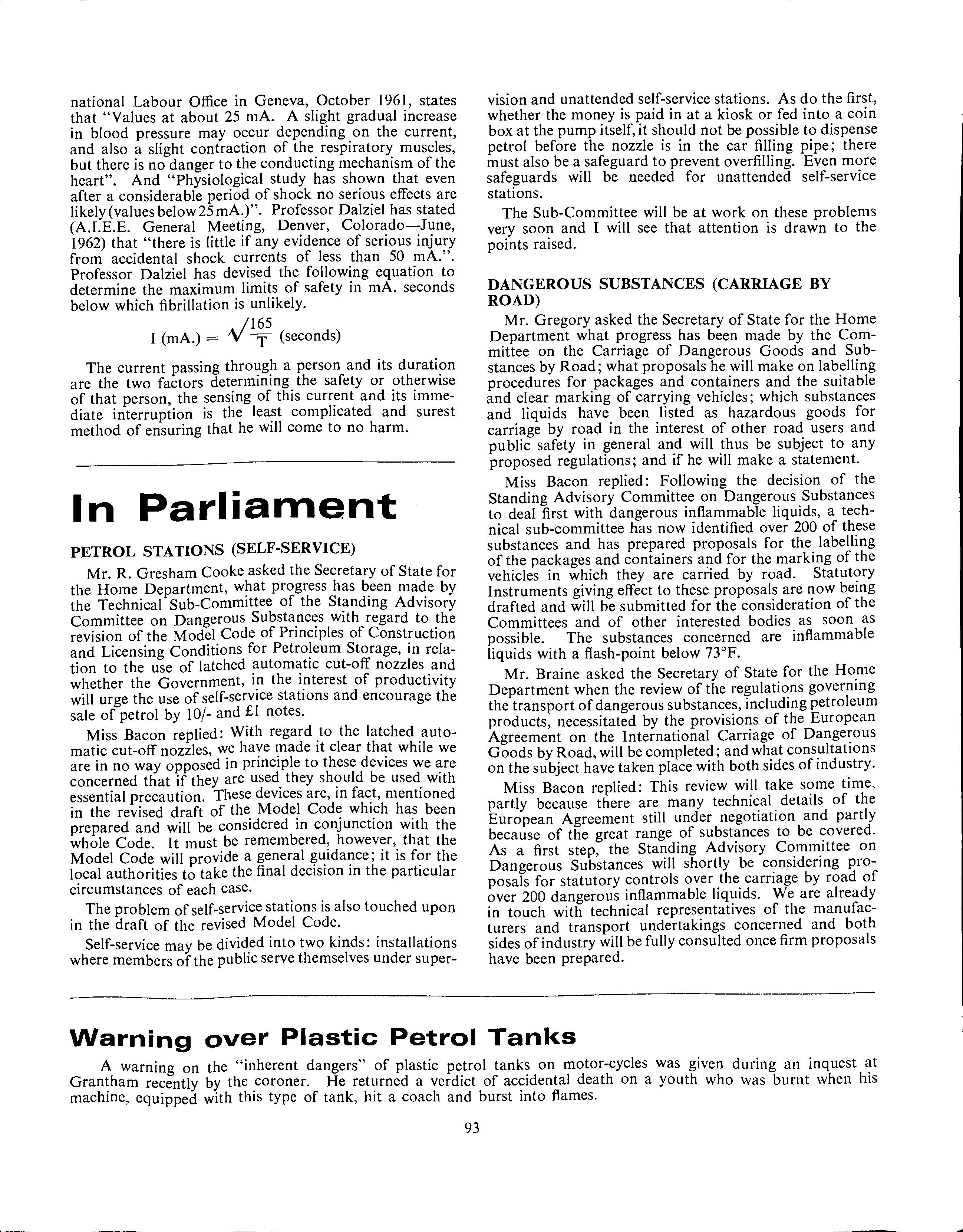
4 minute read
IN PARLIAMENT
national Labour Office in Geneva, October 1961, states that "Values at about 25 mA. A slight gradual increase in blood pressure may occur depending on the current, and also a slight contraction of the respiratory muscles, but there is no danger to the conducting mechanism of the heart". And "Physiological study has shown that even after a considerable period of shock no serious effects are likely(valuesbelow25mA.)". Professor Dalziel has stated (A.I.E.E. General Meeting, Denver, Colorado-June, 1962) that "there is little if any evidence of serious injury from accidental shock currents of less than 50 mA. ". Professor Dalziel has devised the following equation to determine the maximum limits of safety in mA. seconds below which fibrillation is unlikely. I (mA.) = . /165 V T (seconds)
The current passing through a person and its duration are the two factors determining the safety or otherwise of that person, the sensing of this curr~nt and its immediate interruption is the lea~t complicated and surest method of ensuring that he will come to no harm.
Advertisement
PETROL STATIONS (SELF-SERVICE)
Mr. R. Gresham Cooke asked the Secretary of State for the Home Department, what progress has been made by the Technical Sub-Committee of the Standing Advisory Committee on Dangerous Substances with regard to the revision of the Model Code of Principles of Construction and Licensing Conditions for Petro~eum Storage, in relation to the use of latched automatic cut-off nozzles and whether the Government, in the interest of productivity will urge the use of self-service stations and encourage the sale of petrol by IO/- and £1 notes.
Miss Bacon replied: With regard .to the latched .automatic cut-off nozzles we have made 1t clear that while we are in no way oppos~d in principle to these devices we are concerned that if they are used. they sh~rnld be used. with essential precaution. These devices are, m fa~t, mentioned in the revised draft of the Model Code which has been prepared and will be considered in conjunction with the whole Code. It must be remembered, however, that the Model Code will provide a general ~~idai:ice; it is f<;>r the local authorities to take the final dec1s10n m the particular circumstances of each case.
The problem of self-service stations is also touched upon in the draft of the revised Model Code.
Self-service may be divided into two kinds: installations where members of the public serve themselves under supervision and unattended self-service stations. As do the first, whether the money is paid in at a kiosk or fed into a coin box at the pump itself, it should not be possible to dispense petrol before the nozzle is in the car filling pipe; there must also be a safeguard to prevent overfilling. Even more safeguards will be needed for unattended self-service stations.
The Sub-Committee will be at work on these problems very soon and I will see that attention is drawn to the points raised.
DANGEROUS SUBSTANCES (CARRIAGE BY
ROAD)
Mr. Gregory asked the Secretary of State for the Home Department what progress has been made by the Committee on the Carriage of Dangerous Goods and Substances by Road; what proposals he will make on labelling procedures for packages and containers and the suitable and clear marking of carrying vehicles; which substances and liquids have been listed as hazardous goods for carriage by road in the interest of other road users and public safety in general and will thus be subject to any proposed regulations; and if he will make a statement.
Miss Bacon replied: Following the decision of the Standing Advisory Committee on Dangerous Substances to deal first with dangerous inflammable liquids, a technical sub-committee has now identified over 200 of these substances and has prepared proposals for the labelling of the packages and containers and for the marking of the vehicles in which they are carried by road. Statut?ry Instruments giving effect to these proposals are now bemg drafted and will be submitted for the consideration of the Committees and of other interested bodies as soon as possible. The substances concerned are inflammable liquids with a flash-point below 73°F.
Mr. Braine asked the Secretary of State for the Ho.me Department when the review of the regulations governmg the transport of dangerous substances, including petroleum products, necessitated by the provisions of the European Agreement on the International Carriage of Dange~ous Goods by Road, will be completed; and what consultations on the subject have taken place with both sides of industry.
Miss Bacon replied: This review will take some time, partly because there are many technical details of the European Agreement still under negotiation and partly because of the great range of substances to be covered. As a first step, the Standing Advisory C~mm}ttee on Dangerous Substances will shortly be cons1dermg proposals for statutory controls over the carriage by road of over 200 dangerous inflammable liquids. We are already in touch with technical representatives of the manufacturers and transport undertakings concerned and both sides of industry will be fully consulted once firm proposals have been prepared.
Warning over Plastic Petrol Tanks
A warning on the "inherent dangers" of plastic petrol tanks on motor-cycles was given during an inquest at Grantham recently by the coroner. He returned a verdict of accidental death on a youth who was burnt when his machine, equipped with this type of tank, hit a coach and burst into flames.
93







